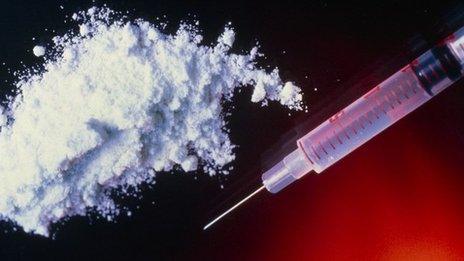Why not... legalise drugs?
- Published
- comments

A look at eye-catching policy ideas that are often talked about but never seem to feature in UK general election campaigns.
The background
Drug prohibition began in the UK during World War I, when the possession, distribution and sale of cocaine and opium was outlawed. Cannabis was added to the list in 1920, in line with international treaties.
For many years, in contrast to the US, the emphasis was on treatment rather than punishment. Heroin was prescribed to addicts on the NHS. But the climate changed in the 1960s, with the explosion in drug use among young people.
The 1971 Misuse of Drugs Act, which categorises drugs by their perceived harm, remains the key piece of legislation.
In 2002, the then Home Secretary, David Blunkett, downgraded cannabis to Class C, only for it to be reclassified as Class B by then Prime Minister Gordon Brown five years later.
As a young Tory MP, David Cameron backed more lenient penalties for the possession of cannabis and ecstasy - and allowing heroin to be prescribed to addicts in "shooting galleries". He was a member of the Home Affairs Select Committee when it called for an international debate on the legalisation of drugs.
Since entering Number 10, he has changed his view and now supports the current laws, in common with his Labour counterpart. Lib Dem leader Nick Clegg said last year that the "war on drugs" was lost and a review of all options was needed.
Danny Kushlick: The case for legalisation
In 1961 the world embarked on a US-led act of collective folly when it identified the non-medical use of specific drugs, including cannabis, cocaine and heroin, as a global threat and attempted to rid the world of them using punitive enforcement.
After 50 years of global prohibition, drugs are cheaper, more available and widely used than ever before; a $300bn (£190bn) a year - and still growing - trade has been gifted to organised criminals and unregulated dealers - creating vast costs for those least able to bear them - undermining public health and human rights, fuelling crime, corruption and conflict, and destabilising entire regions.
So, why has this war not been ended? Why do politicians continue to support it? The fundamental answer is disturbing. Prohibition clearly does not work for the vast majority of the world's citizens. However, it meets the needs of the world's superpowers, who can resource and engage their military, police and criminal justice systems, all justified in the war against the global "drug menace".
And at the same time it meets the needs of global financial markets who launder the billions in illicit profits. As an example HSBC was recently fined $1.9bn for, among other things, laundering $881m of drug cartel money.
To reorient policy in favour of ordinary people, the simple solution is to explore responsible legal regulation of drugs markets. It is a position increasingly supported by Latin American presidents and indeed the US, where citizens in Washington State and Colorado recently voted to legally regulate cannabis markets.
And what of the UK, where 67% of the population support a review of all drug policy options? Despite his previous support for reform, since coming to power David Cameron has become a drug warrior, whilst [Labour leader] Ed Miliband appears to have deserted the most disadvantaged and marginalised by avoiding the drugs issue completely. However, party leaders will shift if voters across the political spectrum prioritise it at election time.
If not, senior politicians will remain in thrall to the US, and the UK will maintain its fervent support for a policy that serves the needs of the elite at the expense of the vast majority.
Kevin Sabet: The case against legalisation
It is easy to be dissatisfied with current drugs policies. Kids report they can get drugs relatively easily, and too many of us have suffered the heartbreak of addiction affecting a loved one or ourselves. The market for drugs is violent and deadly.
But being unhappy with the drug abuse in society is no reason to legalise drugs. In fact, the best evidence we have shows that legalisation would make a bad drug problem much worse - by increasing addiction, normalising use among kids, and relegating its sale to profit-hungry corporations or governments with every incentive to increase addiction to advance their bottom line. Legalisation is a very sloppy way to address the unintended consequences of current policy.
First, we know that legalisation would significantly cheapen the price of cocaine, cannabis, and heroin, making them more accessible and therefore increasing addiction. Additionally, allowing drugs to be sold on the open market implies we would allow the sale of highly dangerous drugs such as crack and methamphetamine by multinational conglomerates.
Big Tobacco would have nothing on Big Meth.
Second, it is unclear that a major attraction of legalisation - the supposed reduction of the violent, underground market - would materialise. As governments put restrictions like age limits on legal drugs, the illicit economy will be happy to step in to fill the gap. We know now that at least 22% of the UK domestic tobacco market consists of black market illegal cigarettes.
Yes, mass incarceration is a bad thing. And the developing world is being torn apart by the UK's appetite for drugs. But rather than legalise - which would increase crime and potentially increase incarceration rates - we should invest more in strategies such as drug treatment, specialised drug treatment courts, better drug prevention, smart enforcement, and international partnerships that promote alternative development.
The UK is moving in the right direction. By expanding treatment and recovery services over the past decade, drug use has fallen almost 15% between 2005 and 2011. But we still have more work to do.
In the legalisation debate, misleading promises and silver bullets abound. Proceed with caution.
- Published18 July 2013
- Published11 July 2013
- Published3 July 2013